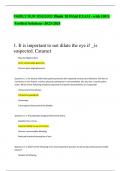Family nur nsg5003 Study guides, Class notes & Summaries
Looking for the best study guides, study notes and summaries about Family nur nsg5003? On this page you'll find 106 study documents about Family nur nsg5003.
All 106 results
Sort by
FAMILY NUR NSG5003 Week 10 Final EXAM - with 100% Verified Solutions -2023-2024
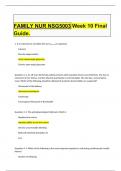
-
FAMILY NUR NSG5003 Week 10 Final Guide.
- Exam (elaborations) • 55 pages • 2024
-
- $14.49
- + learn more
FAMILY NUR NSG5003 Week 10 Final Guide. 1. It is important to not dilate the eye if is suspected. Cataract Macular degeneration Acute closed-angle glaucoma Chronic open-angle glaucoma Question 2. 2. An 18-year-old female patient presents with repeated urinary tract infections. She has no risk factors in her history, and her physical examination is unremarkable. She also has a normal pelvic exam. Which of the following should be obtained if anatomic abnormalities are suspected? Ult...
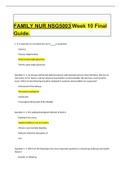
-
FAMILY NUR NSG5003 Week 10 Final Guide.
- Exam (elaborations) • 55 pages • 2023
-
- $14.49
- + learn more
FAMILY NUR NSG5003 Week 10 Final Guide. 1. It is important to not dilate the eye if is suspected. Cataract Macular degeneration Acute closed-angle glaucoma Chronic open-angle glaucoma Question 2. 2. An 18-year-old female patient presents with repeated urinary tract infections. She has no risk factors in her history, and her physical examination is unremarkable. She also has a normal pelvic exam. Which of the following should be obtained if anatomic abnormalities are suspected? Ult...
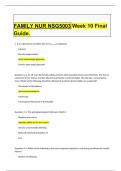
-
FAMILY NUR NSG5003 Week 10 Final Guide.
- Exam (elaborations) • 55 pages • 2023
-
- $12.89
- + learn more
FAMILY NUR NSG5003 Week 10 Final Guide. 1. It is important to not dilate the eye if is suspected. Cataract Macular degeneration Acute closed-angle glaucoma Chronic open-angle glaucoma Question 2. 2. An 18-year-old female patient presents with repeated urinary tract infections. She has no risk factors in her history, and her physical examination is unremarkable. She also has a normal pelvic exam. Which of the following should be obtained if anatomic abnormalities are suspected? Ult...
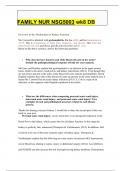
-
FAMILY NUR NSG5003 wk8 DB
- Exam (elaborations) • 3 pages • 2024
-
- $12.99
- + learn more
FAMILY NUR NSG5003 wk8 DB Overview of the Mechanisms of Kidney Function Ms. Cornwall is admitted with pyelonephritis. She has chills, and her temperature is 101°F. She is complaining of flank pain, frequency, and dysuria. Her urine has white blood cell casts and shows growth of Escherichia coli (E. coli). Based on the above scenario, answer the following questions: • Why does she have bacteria and white blood cell casts in her urine? Include the pathophysiological response of bo...
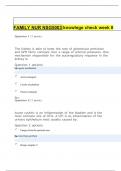
-
FAMILY NUR NSG5003 knowlege check week 8
- Exam (elaborations) • 4 pages • 2023
-
- $10.19
- + learn more
FAMILY NUR NSG5003 knowlege check week 8 Question 1 (1 point) The kidney is able to keep the rate of glomerular perfusion and GFR fairly constant over a range of arterial pressures. One mechanism responsible for the autoregulatory response in the kidney is: Question 1 options: Active transport Carrier mechanism
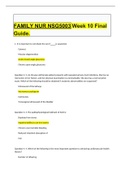
-
Exam (elaborations) FAMILY NUR NSG5003 Week 10 Final Guide.
- Exam (elaborations) • 55 pages • 2022
-
- $13.49
- + learn more
FAMILY NUR NSG5003 Week 10 Final Guide. 1. It is important to not dilate the eye if is suspected. Cataract Macular degeneration Acute closed-angle glaucoma Chronic open-angle glaucoma Question 2. 2. An 18-year-old female patient presents with repeated urinary tract infections. She has no risk factors in her history, and her physical examination is unremarkable. She also has a normal pelvic exam. Which of the following should be obtained if anatomic abnormalities are suspected? Ult...
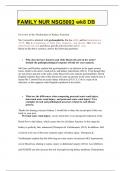
-
FAMILY NUR NSG5003 wk8 DB
- Exam (elaborations) • 3 pages • 2024
- Available in package deal
-
- $12.99
- + learn more
FAMILY NUR NSG5003 wk8 DB Overview of the Mechanisms of Kidney Function Ms. Cornwall is admitted with pyelonephritis. She has chills, and her temperature is 101°F. She is complaining of flank pain, frequency, and dysuria. Her urine has white blood cell casts and shows growth of Escherichia coli (E. coli). Based on the above scenario, answer the following questions: • Why does she have bacteria and white blood cell casts in her urine? Include the pathophysiological response of bo...
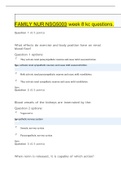
-
FAMILY NUR NSG5003 week 8 kc questions.
- Exam (elaborations) • 10 pages • 2022
-
- $14.99
- + learn more
FAMILY NUR NSG5003 week 8 kc questions. Question 1 (0.5 points) What effects do exercise and body position have on renal blood flow? Question 1 options: They activate renal parasympathetic neurons and cause mild vasoconstriction. Both activate renal parasympathetic neurons and cause mild vasodilation. They activate renal sympathetic neurons and cause mild vasodilation. Save Question 2 (0.5 points) Blood vessels of the kidneys are innervated by the: Question 2 o...
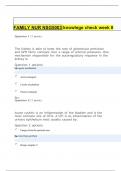
-
FAMILY NUR NSG5003 knowlege check week 8
- Exam (elaborations) • 4 pages • 2024
- Available in package deal
-
- $12.49
- + learn more
FAMILY NUR NSG5003 knowlege check week 8 Question 1 (1 point) The kidney is able to keep the rate of glomerular perfusion and GFR fairly constant over a range of arterial pressures. One mechanism responsible for the autoregulatory response in the kidney is: Question 1 options: Active transport Carrier mechanism Passive transport Save Question 2 (1 point) Acute cystitis is an inflammation of the bladder and is the most common site of UTIs. A UTI is an inflammation of...

Do you wonder why so many students wear nice clothes, have money to spare and enjoy tons of free time? Well, they sell on Stuvia! Imagine your study notes being downloaded a dozen times for $15 each. Every. Single. Day. Discover all about earning on Stuvia

